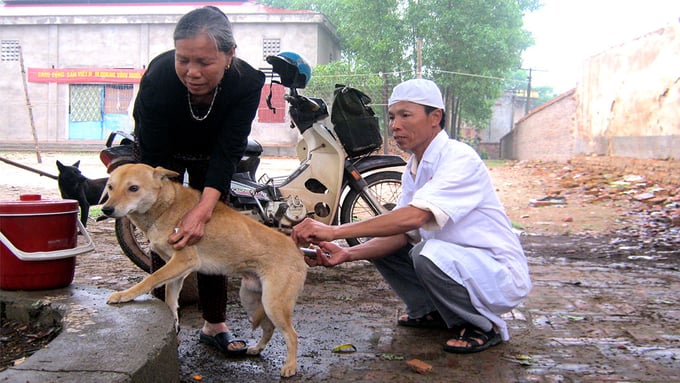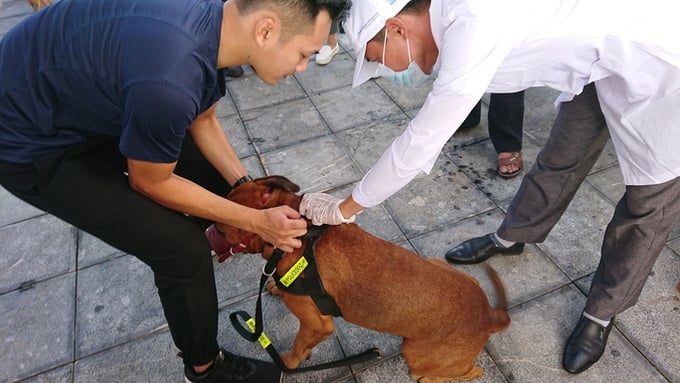May 18, 2025 | 08:46 GMT +7
May 18, 2025 | 08:46 GMT +7
Hotline: 0913.378.918
May 18, 2025 | 08:46 GMT +7
Hotline: 0913.378.918
Rabies has claimed the lives of 410 Vietnamese people and left 2.7 million others in need preventive treatment over the past five years. The disease has greatly affected public health and caused heavy economic losses. Vietnam recorded 70 deaths from rabies in 2022 and 23 deaths in the first 3 months of 2023. The risk of rabies continuing to occur and cause death in humans is very high.
In order to improve the effectiveness of rabies prevention as well as reduce deaths from rabies, the Prime Minister issued Directive No. 11/CT-TTg dated April 21 on urgent measures to prevent and control rabies.

The heads of local People's Committees are fully responsible for directing and organizing rabies prevention and control measures. Photo: PH.
The aforementioned directive requires ministers, heads of relevant agencies, and chairmen of local People's Committees to focus resources on organizing drastic rabies prevention measures according to regulations under the Law on Animal Health, the Law on Infectious Diseases Prevention, and other related legal documents.
The Prime Minister issued Decision No. 2151/QD-TTg dated December 21, 2021 approve the National Rabies Prevention and Control Program from 2022 to 2030.
Accordingly, the Prime Minister requested the Chairman of local People's Committees to direct relevant departments and agencies in implementing solutions that are suitable for each region. Local People's Committees were also advised to regularly inspect the observance of the law on rabies prevention in humans and animals.
The heads of local People's Committees are fully responsible for directing and organizing the effective implementation of rabies prevention and control measures. Additionally, they must discipline irresponsible cadres and civil servants who fail to manage rabies prevention effectively.
Resources will be mobilized to implement local rabies prevention and control plans, prioritize the purchase of vaccines, and organize rabies vaccination for dogs and cats simultaneously.
Local authorities will support ethnic minority areas, remote areas, impoverished areas, etc. with funds to purchase vaccines, organize rabies vaccination for local dogs and cats.
Additionally, local officials must collect accurate statistics regarding number of households with dogs and cats in each residential area, village and commune. Subsequently, these families must be instructed to keep their pets within the households, ensure hygienic animal health conditions.
Households are advised to vaccinate their dogs and cats against rabies as per regulations. Furthermore, the Vietnam Animal Health Information Management System (VAHIS) must be kept up to date.
The Government has requested local People's Committees to coordinate with specialized animal health management agencies to organize rabies vaccination for dogs and cats. The target vaccination coverage rate is at least 70% of the total herd from 2023 to 2025 and at least 80% from 2026 to 2030. Routine inspection is advised in order to prevent unvaccinated animals.
Specialized medical and animal health agencies are responsible for informing the chairman of local people's committees if they discover potential cases of rabies in human as a result of animal bites. Subsequently, they must identify the causes and implement solutions for disease prevention and control according to regulations.
Dog owners are responsible for strictly complying with regulations on dog management: dogs must be kept on leash, dogs must wear muzzles outdoors, rabies vaccination for dogs are required.
Communities must be informed on the dangers posed by rabies, symptoms used to identify infected animals, and effective measures to prevent rabies, especially among children and those living in rural and dangerous areas.
Local governments need to ensure the accessibility of human rabies vaccines, promote rabies vaccination sites and guide victims to medical facilities for timely preventive treatment.
Local People's Committees shall direct, review and organize the construction of rabies-free zones, especially in tourist areas, cities, towns and densely populated areas.
Furthermore, they must strengthen sanctions on violations regarding dog breeding and rabies vaccination as prescribed under Decree No. 90/2017/ND-CP dated July 31, 2017; inspect and handle administrative violations against organizations and individuals that use unrecognized preventative measures or unlicensed drugs to treat people with rabies.
According to the Directive, the Ministry of Agriculture and Rural Development and the Ministry of Health will coordinate with ministries, branches and local governments in promulgating guiding documents on the prevention and control of rabies.
Technical solutions will be implemented to quickly control rabies according to the goals set out under the National Program.

The Government requested local governments to set up inspection teams for local rabies prevention and control. Photo: PH.
Resources and funds will allocated to implement activities listed under the National Plan. Communication campaigns on rabies prevention and control measures will be run on central media such as VTV, VOV, Nhan Dan Newspaper, Vietnam Agriculture Newspaper, etc. to enhance the responsibility of dog owners to the community.
The Government requested local governments to set up inspection teams for local rabies prevention and control; strengthen surveillance to detect rabies cases within the community; follow the "One Health" approach with close coordination between the Health and Animal Health sectors; ensure that governmental regulations are observed.
Specialized agencies are advised to strengthen research, coordinate with businesses in producing and supplying rabies vaccines domestically, and reduce vaccine product costs.
Local authorities are proposed to support rabies vaccine and anti-rabies serum for preventive treatment in ethnic minority areas, remote and impoverished areas; supplement health insurance policies for victims of dog bites.
The Government requested the Ministry of Education and Training to coordinate with the Ministry of Agriculture and Rural Development and the Ministry of Health in formulating and implementing a school communication plan on rabies prevention and control.
The Ministry of Information and Communications will direct press agencies and media to promote information on rabies prevention and control according to documents provided by the Ministry of Agriculture and Rural Development and the Ministry of Health.
Translated by Nguyen Hai Long

(VAN) 14 out of 35 domesticated elephants in Dak Lak province have had their living conditions improved, with 11 of them currently participating in the non-riding elephant tourism model.

(VAN) Muong Nhe Nature Reserve hopes that being upgraded to a national park will lay the foundation for forest protection efforts to be carried out in a systematic, modern, and sustainable manner.
/2025/05/16/3923-2-171845_52.jpg)
(VAN) Lower costs, higher yields, and improved soil quality are outstanding benefits that soybeans bring when integrated into the crop rotation system.

(VAN) The 'For a Green National Environment' programme aims to promote a green lifestyle, support businesses in implementing ESG practices, and turn Net Zero commitments into concrete actions.

(VAN) Cold-barn systems efficiently manage environmental and temperature conditions, which aids in the prevention of respiratory diseases in pigs and protects them from the vectors that transmit African swine fevers.

(VAN) To tackle challenges, the project 'Addressing key technical bottlenecks in the grouper supply chain in Vietnam' has been underway since 2024.

(VAN) The project 'Disease-Resilient and Sustainable Cassava Production Systems in the Mekong Region', funded by the Australian Center for International Agricultural Research (ACIAR), is being implemented from 2024 to 2028.